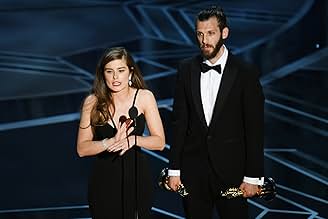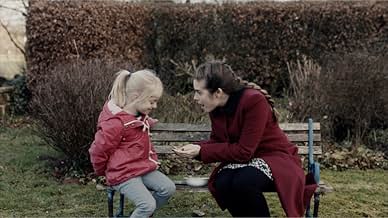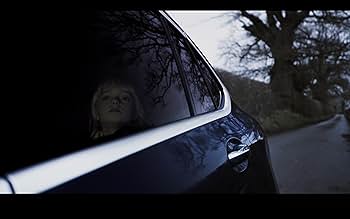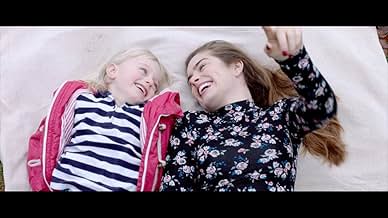NOTE IMDb
7,7/10
3,2 k
MA NOTE
Ajouter une intrigue dans votre langueA deaf 6-year-old girl named Libby lives in a world of silence until a caring social worker teaches her to use sign language to communicate.A deaf 6-year-old girl named Libby lives in a world of silence until a caring social worker teaches her to use sign language to communicate.A deaf 6-year-old girl named Libby lives in a world of silence until a caring social worker teaches her to use sign language to communicate.
- Réalisation
- Scénario
- Casting principal
- Récompensé par 1 Oscar
- 25 victoires et 8 nominations au total
Avis à la une
Joanne (Rachel Shenton) is the new tutor for a young deaf girl named Libby. Her mother is concerned about her learning sign language and would rather have her lip-reading. This leads to a conflict with Joanne who starts teaching the girl sign language.
This is an Oscar winning short. It's actually a very compelling two thirds of a movie. Shenton and the little girl are amazing together. It's emotional and it has a message. This would make for a nice stepping stone to a full length movie.
This is an Oscar winning short. It's actually a very compelling two thirds of a movie. Shenton and the little girl are amazing together. It's emotional and it has a message. This would make for a nice stepping stone to a full length movie.
The mother was deaf in ways of her own, wasn't she? A touching story, beautiful cinematography, and a lovely pair of actors in the social worker and deaf child (Rachel Shenton and Maisie Sly), make this a good short, even if it is a little heavy-handed.
What a wonderfully made and beautiful movie. I am a 38 year old male reduced to tears within minutes. Well done on bringing awareness in such a beautiful way. Can't stop thinking about the movie.
Greetings again from the darkness. Few things are more disheartening and frustrating than seeing a child neglected by their parents. When that child is deaf or hearing-impaired, the actions of such parents cross over to infuriating. Such is the topic of this gut-wrenching short film from writer Rachel Shenton and director Chris Overton.
While we usually assume parents are focused on the best interests of the child, this expertly crafted film shows us just how easy it is for everyday life to impact our best intentions. Four year old Libby (Maisie Sly) is the youngest child in a typically busy home. Work, school and activities keep the others swarming around her - leaving young Libby in an isolated state of confusion. Libby is profoundly deaf, unable to communicate with her family, and rarely even interacts. Her mother (played by Rachel Fielding) is the on-the-go type who wants her daughter to be normal, and absent-mindedly yells "Bye Libby" as she heads out for her next errand.
When social worker/tutor Joanne (writer Shenton) is hired to prepare Libby for school, it isn't long before the two are conversing through sign-language and young Libby comes alive ... playing in the park and asking for orange juice. It's a beautiful thing to watch unfold.
Early on, the film addresses that Libby "does not qualify" for a cochlear implant, which apparently was the last bit of effort her mother expended in trying to make her "normal". The film is beautifully shot and carries the strong message that with a bit of support, deaf children can be mainstreamed into schools - though I do wish some more attention had been given to cochlear implants. Ending with a couple of sobering statistics, it's refreshing to know that Ms. Shenton is an activist supporting the deaf community.
While we usually assume parents are focused on the best interests of the child, this expertly crafted film shows us just how easy it is for everyday life to impact our best intentions. Four year old Libby (Maisie Sly) is the youngest child in a typically busy home. Work, school and activities keep the others swarming around her - leaving young Libby in an isolated state of confusion. Libby is profoundly deaf, unable to communicate with her family, and rarely even interacts. Her mother (played by Rachel Fielding) is the on-the-go type who wants her daughter to be normal, and absent-mindedly yells "Bye Libby" as she heads out for her next errand.
When social worker/tutor Joanne (writer Shenton) is hired to prepare Libby for school, it isn't long before the two are conversing through sign-language and young Libby comes alive ... playing in the park and asking for orange juice. It's a beautiful thing to watch unfold.
Early on, the film addresses that Libby "does not qualify" for a cochlear implant, which apparently was the last bit of effort her mother expended in trying to make her "normal". The film is beautifully shot and carries the strong message that with a bit of support, deaf children can be mainstreamed into schools - though I do wish some more attention had been given to cochlear implants. Ending with a couple of sobering statistics, it's refreshing to know that Ms. Shenton is an activist supporting the deaf community.
Introduction: The short film The Silent Child (2017), 20m, a brilliant low budget film ($10k) made by Chris Overton, with a pleasant play and a fantastic multi-layered screenplay of Rachel Shenton, great cinematography by Ali Farahani, and impressive music composed by Amir Konjani, was truly deserved to achieve the title of the best short film at the Oscars 2018.
Plot theme: The theme of the first layer of the film can be seen as a detailed and pathological approach to the problems of deaf or hard-of-hearing children. Only the very same sentence that Joanna hears from Paul that the reason why she was called to this house, hasn't been to understand Libby but to help Sue feel more comfortable in controlling affairs, can represent the depth of the problem of these children. The filmmaker plays his impressive role well by presenting brief but tragic statistics in the end credits of the film. Although this layer of the film is capable of a detailed critique of the exact details of the plot, cinematography, and music of the film, I prefer to have a metatextual look at the symbolic theme (second layer) of the movie in my short opportunity because it may be in shadows and less visible.
Meta-textual layer: In my view, this film with its elaborate use of symbols and characters, expresses another story of reason in opposition with love, and warns against the fall of the meaning of life and the tragedy of forgetting love! Some of these used symbols are:
The mother as the motherland, procreation, and affairs of sensory including reason. She is an entire and full-time controller who is very willing to turn anything into her own language and logic, in order to master it. With this ignorance, she misses the opportunities in front of her to accept the special language of love (Libby) and enjoy this tenderness, and even considers the messenger of this truth (Joanna) as a disturbing threat.
The deaf child (Libby) as the element of Love, the innocent child that is silent from speech but susceptible to miracles, she is from an unknown lineage and the result of the bond of odd but alien love!
The helper girl in red (Joanna) as an element of femininity, who understands love and finds it (Libby) easily behind every tree while the closest members of her family are unable to understand her.
The family and society as ego and superego, a language structure powered by laws and ideals, but just bring busyness and coldness of daily routine, and its members only seek to weaken the other and acquire a position of greater power and control.
Sign-language as a symbol of the intuitive love language.
The school, a symbol of prison show which imposes a dictatorial regime on its captives to restrain love and homogenize all members of the society of the modern world.
The filmmaker has depicted the presence and absence of love on the roads of Joanna's route with sensory and visual presentation, and the audience subconsciously finds the atmosphere of the movie foggy or clear in accordance with hiding or finding love during the story. It can be seen that all the names of the story have been chosen very carefully according to the mentioned symbols. By reflecting on the roots and the origins of the names of the characters such as Libby, Joanna, Sue and Paul can find the deep connection of these choices in the role of the types of the story. This approach even leads us to the third and more sublime layer of the film's theme, which is not possible in this review.
A thought-provoking open-end: The intelligent and brilliant open-end in the film after the romantic display of expressing love between Libby and Joanna from behind the bars of the school (the prison) raises this question for the audience: What will the end be like? Do you really want to know what happens to Libby? Will this remain a full-blown tragedy? The answer is up to you, it depends on what you will do to free up your Libby...
Plot theme: The theme of the first layer of the film can be seen as a detailed and pathological approach to the problems of deaf or hard-of-hearing children. Only the very same sentence that Joanna hears from Paul that the reason why she was called to this house, hasn't been to understand Libby but to help Sue feel more comfortable in controlling affairs, can represent the depth of the problem of these children. The filmmaker plays his impressive role well by presenting brief but tragic statistics in the end credits of the film. Although this layer of the film is capable of a detailed critique of the exact details of the plot, cinematography, and music of the film, I prefer to have a metatextual look at the symbolic theme (second layer) of the movie in my short opportunity because it may be in shadows and less visible.
Meta-textual layer: In my view, this film with its elaborate use of symbols and characters, expresses another story of reason in opposition with love, and warns against the fall of the meaning of life and the tragedy of forgetting love! Some of these used symbols are:
The mother as the motherland, procreation, and affairs of sensory including reason. She is an entire and full-time controller who is very willing to turn anything into her own language and logic, in order to master it. With this ignorance, she misses the opportunities in front of her to accept the special language of love (Libby) and enjoy this tenderness, and even considers the messenger of this truth (Joanna) as a disturbing threat.
The deaf child (Libby) as the element of Love, the innocent child that is silent from speech but susceptible to miracles, she is from an unknown lineage and the result of the bond of odd but alien love!
The helper girl in red (Joanna) as an element of femininity, who understands love and finds it (Libby) easily behind every tree while the closest members of her family are unable to understand her.
The family and society as ego and superego, a language structure powered by laws and ideals, but just bring busyness and coldness of daily routine, and its members only seek to weaken the other and acquire a position of greater power and control.
Sign-language as a symbol of the intuitive love language.
The school, a symbol of prison show which imposes a dictatorial regime on its captives to restrain love and homogenize all members of the society of the modern world.
The filmmaker has depicted the presence and absence of love on the roads of Joanna's route with sensory and visual presentation, and the audience subconsciously finds the atmosphere of the movie foggy or clear in accordance with hiding or finding love during the story. It can be seen that all the names of the story have been chosen very carefully according to the mentioned symbols. By reflecting on the roots and the origins of the names of the characters such as Libby, Joanna, Sue and Paul can find the deep connection of these choices in the role of the types of the story. This approach even leads us to the third and more sublime layer of the film's theme, which is not possible in this review.
A thought-provoking open-end: The intelligent and brilliant open-end in the film after the romantic display of expressing love between Libby and Joanna from behind the bars of the school (the prison) raises this question for the audience: What will the end be like? Do you really want to know what happens to Libby? Will this remain a full-blown tragedy? The answer is up to you, it depends on what you will do to free up your Libby...
Le saviez-vous
- AnecdotesRachael Shenton signed along with her Academy Award acceptance speech (using British Sign Language BSL) after making a promise to her co-star Maisie Sly, that she would do so if they won.
- ConnexionsFeatured in The Oscar Nominated Short Films 2018: Live Action (2018)
Meilleurs choix
Connectez-vous pour évaluer et suivre la liste de favoris afin de recevoir des recommandations personnalisées
Détails
- Date de sortie
- Pays d’origine
- Sites officiels
- Langues
- Aussi connu sous le nom de
- La niña silenciosa
- Lieux de tournage
- Sociétés de production
- Voir plus de crédits d'entreprise sur IMDbPro
Box-office
- Budget
- 10 000 £GB (estimé)
- Durée
- 20min
- Couleur
- Rapport de forme
- 2.35 : 1
Contribuer à cette page
Suggérer une modification ou ajouter du contenu manquant




















